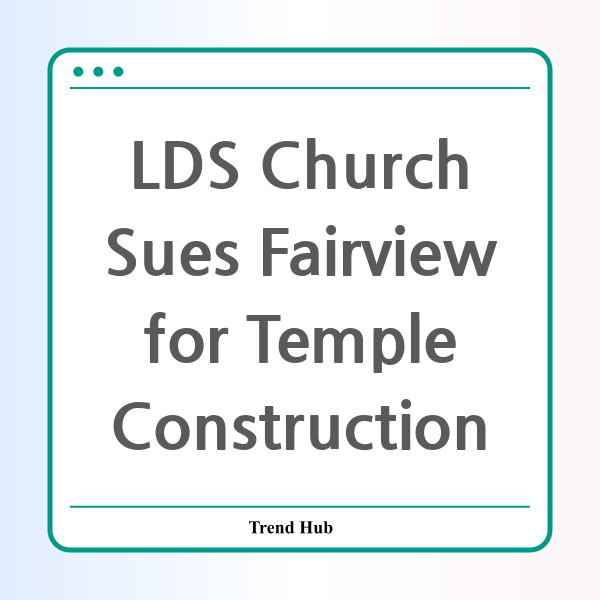* This website participates in the Amazon Affiliate Program and earns from qualifying purchases.

What happens when a church’s right to build a house of worship collides with local government regulations? The Church of Jesus Christ of Latter-day Saints (LDS Church) is about to find out as it prepares to sue the town of Fairview, Texas, over the construction of the McKinney Texas Temple.
On January 27, the church issued a notice of intent to sue Fairview after the town denied its permit request for the temple. This legal action is based on the Texas Religious Freedom Restoration Act, which upholds the religious rights of individuals and organizations to practice their faith without undue burden. In their letter, attorney Eric Pinker articulated that the town’s denial amounted to a significant hindrance on the church’s ability to organize religious practices, positioning it as a critical moment for religious freedom.
Fairview, located approximately 30 miles north of Dallas, initially tried to negotiate a compromise with the LDS Church. In November, the town's council and church representatives discussed adjustments, including a reduction in the temple's height and size. The church agreed to shrink the building’s dimensions, making substantial concessions in hopes of meeting the community's concerns. However, the revised application faced public backlash, and the local government appeared unwilling to accept the amended plans.
As the conflict escalated, Fairview residents voiced their opinions. Many were against the temple, particularly regarding its height, with some advocating for it to match the existing 68-foot tall meetinghouse. This tug-of-war has placed the town in a precarious position, with the town council actively seeking funds to protect against potential litigation from the LDS Church. Town officials have expressed a commitment to maintaining Fairview's character but have struggled to find common ground with church members.
For the LDS Church, the need for a temple is imperative. According to church representatives, the existing Dallas temple is insufficient to accommodate the growing population of Latter-day Saints in North Texas. Some members currently travel over three hours to attend services at the temple, while a second temple is still under construction in Fort Worth. In their communications, church spokesperson Melissa McKneely emphasized that a temple holds unique significance in their faith, serving as a sacred space for worship, ceremonies, and spiritual reflection. She argued that meetinghouses simply do not meet the needs of their expanding congregation, saying, "We need a temple. A temple allows us to do ceremonies and worship in a different way."
The town's efforts to restrict the temple's construction have drawn the ire of residents who perceive the situation as a chance to defend their community against what they believe to be the encroachment of a powerful institution. Fairview resident Alycia Kuehne articulated this sentiment at a council meeting, stating her support for a legal confrontation with the church, reflecting the contentious atmosphere surrounding this issue.
The ongoing dispute highlights the broader concern of religious rights versus local governance. The LDS Church has maintained that they have made extensive efforts to negotiate and compromise, only to be met with ongoing opposition from the town government. McKneely articulated the church’s perspective, emphasizing their desire to worship peacefully within the community and to contribute to the local area rather than act against it.
As the situation develops, many are left wondering: Will this legal battle set a precedent for how communities engage with religious institutions? How will this impact the relationship between the church and the residents of Fairview? Only time will tell, but one thing is clear — the importance of religious freedom and community governance remains a deeply complex and often contentious issue in America today.
* This website participates in the Amazon Affiliate Program and earns from qualifying purchases.